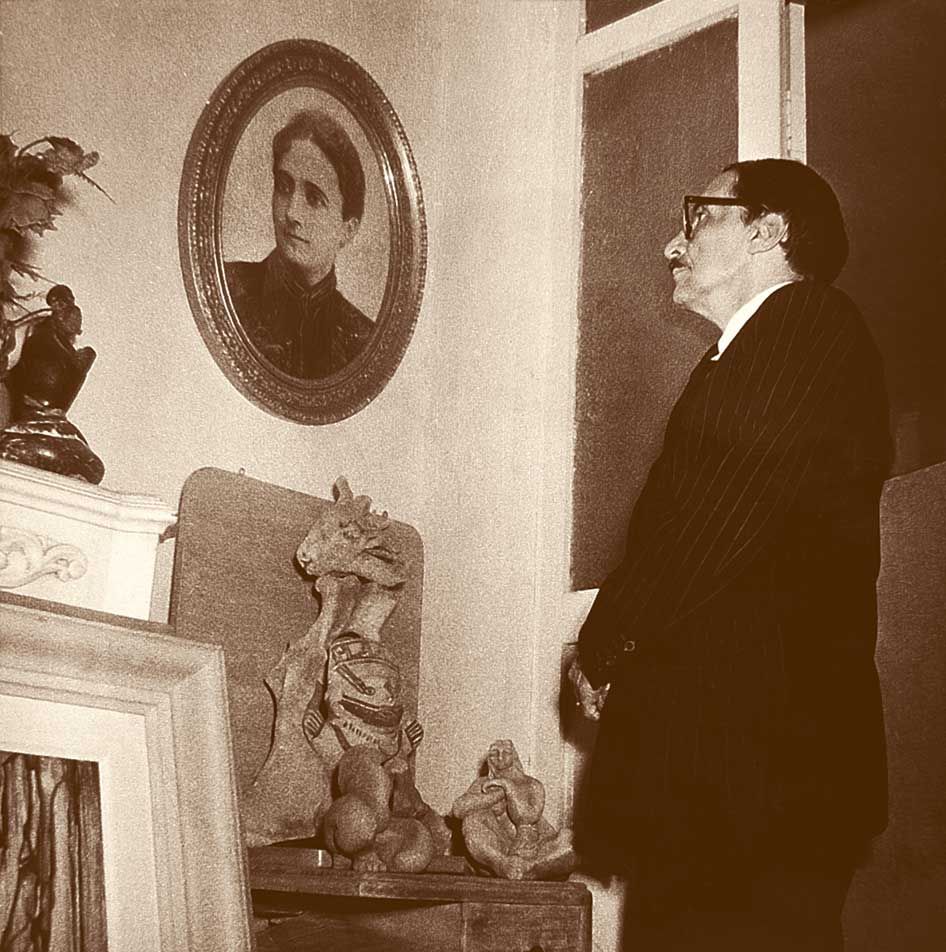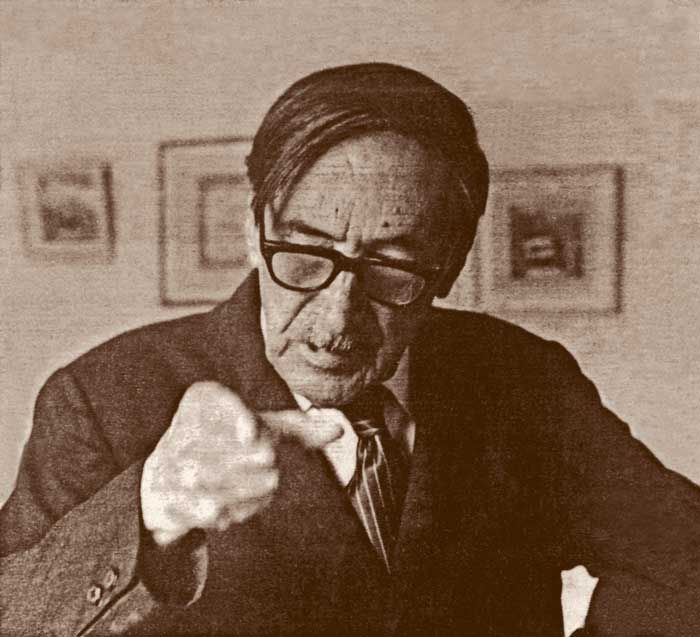Macedonio contemplating a portrait of his mother, Mrs. Adelaida Collard Mendoza.

He spent these years surrounded by his grandchildren given that Gustavo, who was married to Marta Recavarren Gastañeta, had produced three offspring: Gustavo, Rebeca and Carlos. Macedonio´s youngest son, Víctor, married to María Gabriela de la Piedra Russo, had brought five children into the world: Bertha, Víctor Julio, Clarisa, Diego and Jerónimo. One of the most significant tributes that Macedonio would later receive during his active golden years was that extended by the “Central Club” of Trujillo, on August 14, 1978. On this date, he was awarded the Golden Medal of the City and was designated an Illustrious Son of Trujillo. Additionally, the National Institute of Culture, through the La Libertad chapter, awarded the artist a title of merit commemorating his significant plastic contributions. Macedonio added these honors to those he had received from the city twenty- five years earlier.
It was in his later years that our artist´s reputation as a “curious character” was born, and depictions of his life were filled with anecdotal stories. These were joyful anecdotes that revealed a spontaneous and independent soul that was beyond stereotypes and conventions. It was certainly no easy task to communicate with someone who moved so rapidly and without warning from one topic to the next, or who laughed unexpectedly about some aspect of reality, or who poked fun at the “rusticanos” that although wealthy were uninterested in art.
Macedonio´s singularity was evident in his daily routine, including his habit of mixing entrees, consommés and desserts on the same plate, much to the consternation of his fellow diners, who were amazed how the order of the factors failed to alter the product. Despite the fact that he wore no watch, he could give the time with surprising accuracy, much to the amazement of those who asked. He was also extremely lucky at games of chance, winning lotteries on several occasions due to the faith he held in a certain set of numbers. When Macedonio played cards, he was frequently victorious in his game of choice: slap draw. He had inherited his liking for games with friends from his father and grandfather, who had, as was customary in the provinces, been good players. This inclination led Macedonio not only to relatives´ homes but also to the Departmental Club La Libertad, located on the second floor of a very old “Venetian” home on the Paseo Colon in Lima. He would arrive at the doors of this establishment at all hours, always ready for a game of slap draw, poker or the “parrot.” Upon his return to Trujillo in 1961, for an exhibition of his art in the “Libertad” club, he participated in an event that became part of the city’s anecdotal history: on the day that the exhibition was to be inaugurated, Macedonio decided to pay a visit to relatives and friends who, thanks to their economic resources, belonged to the upper rungs of the city’s society. After extending a greeting, he asked each for their personal cards. Upon arrival at the exhibition, everyone was surprised to find that each of his or her cards had been placed in the frames of a painting, indicating as such an intention to buy... but the story doesn’t end here. Given that this sales tactic had been so successful, Macedonio asked the members of the “Central” club to leave the card tables clear for him in the evening because he wanted to invite a group of friends and relatives to play a few hands. His playing buddies eagerly conceded, and as such tacitly supported Macedonio in his search for opportunities to win. Enthusiastic about the game, and happy about the money he would soon receive from the paintings he had sold, Macedonio ordered a splendid meal for his fellow players, complete with the finest champagne and highest quality wines. Despite the good will of his fellow players, the painter was besieged by bad luck: by two in the morning he had lost an amount equivalent to that which he would have to pay for the meal he had so benevolently ordered! His guests were about to leave when Macedonio asked them to stay to play a few rounds for money. It was here, to everyone’s amazement, that the painter recuperated all that he had lost! He had enough to pay the bill and was still left with a sizeable amount. The artist was so excited that he continued the festivities until sunrise at the home of the Pinillos Hoyle in Plaza Mayor, where he delighted all with his enthusiastic piano renditions.
Macedonio contemplating a portrait of his mother, Mrs. Adelaida Collard Mendoza.


Macedonio in his later years in one of his characteristic poses.
Macedonio had other eccentricities. Carlos Manuel Porras Vargas, the painter´s friend and companion at “El Molino” and a veteran journalist from Trujillo, told us the following story, set in 1961: “Macedonio´s exhibition and sale was taking place. I accompanied him on a walk around our city of Trujillo, to which he had returned after several years abroad. Macedonio told me which places he wanted me to see. As we came close to Francisco Pizarro Street at the intersection of Gamarra, I started to walk towards the building where the paper “La Industria” was located. Macedonio stopped abruptly, refusing to go on. Surprised, I said: “But Macedonio, the paper is right next to your house, why don´t you want to go there? “No way, he said as he waved his hand in the air. That house brings back sad memories.”
“Carlos Manuel Porras told us another story about the persecution of members of the APRA party. Carlos said: “I was in Lima and often spent time with Macedonio in his studio on Mogollón street. As I had been imprisoned in 1932, I was on the police “blacklist,” reason for which I slept in different places. Despite my circumstances, I went to visit the painter but found him out. What had happened? Macedonio had hidden, convinced that he too was wanted.... because he was the leader of the party’s cousin!”
The poet Julio Garrido Malaver, with whom Macedonio had forged a solid friendship, recalled that art was everything for our painter. The poet, who possessed a strange sense of humor, told me: “He had convinced himself that he had cured the pneumonia he had contracted on a trip to Puno by listening to a recording of Beethoven’s Ninth Symphony!” Macedonio was sometimes prey to unpredictable passions such as when he distanced himself from Víctor Raul Haya de la Torre for several years due to the fact that one of Víctor Raul’s nieces had published articles against the party leader and Macedonio had chosen to defend the girl. “But his attitude was mixed with curious feelings. He told me that he could not tolerate the fact that Víctor Raul slept in Villa Mercedes in the same bed in which he had been born.”
In the 1950´s, Macedonio attended informal gatherings in the home of Antenor Orrego, an essayist who had just been released from a political prison after completing a sentence imposed by the dictatorial government of General Manuel A. Odría. The poet José Lora y Lora, the Berger brothers, the poet Julio Garrido Malaver (when in Lima) and Alfredo Arana were also participants in these round table discussions. Arana told us “all of these individuals had very different temperaments, so these discussions were host to a bevy of dissenting opinions.”
Macedonio couldn’t stand Lora´s penetrating gaze, and his animosity was pushed to the limit the day that one of the Bergers brought a portrait that Lora had made of a yacht from Lambeyeque. Macedonio took one look at the portrait and declared: “Insufferable.” Immediately, he left the room in indignation….”
Alfredo Arana told us about another one of Macedonio´s unpredictable reactions: “At that time we met on Mondays with a group of artists. One time, the director of the Symphony orchestra of Venezuela came to Lima with a chamber ensemble. He mentioned the name of one of the melodies that the orchestra often played. To the surprise of all those present, Macedonio jumped like a spring and said: “You shouldn’t sing that song.” At this point, the painter´s wife explained that this particular melody was sung by their son Gustavo.” Everyone watched in shock as Macedonio and his wife left the meeting abruptly.